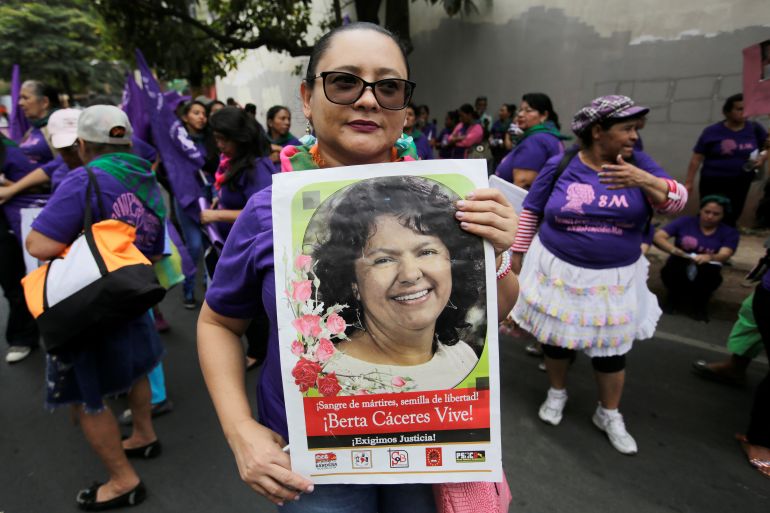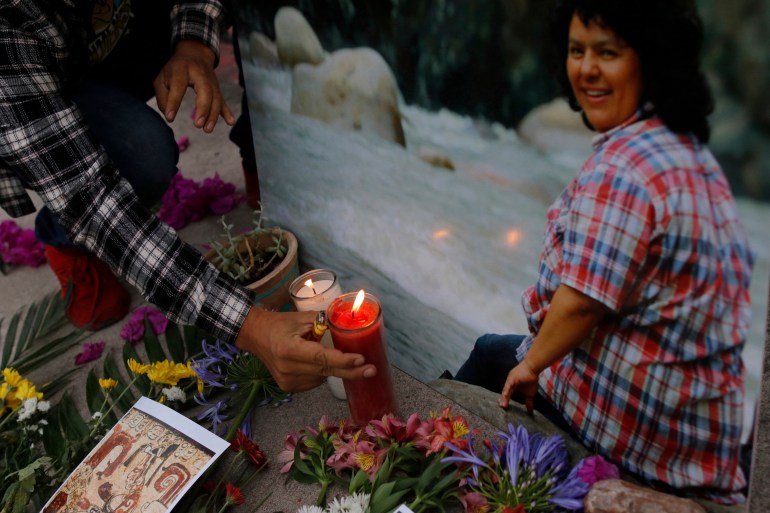Berta Caceres murder: Court finds construction executive guilty
Honduran court finds David Castillo guilty of being a collaborator in 2016 murder of Indigenous activist Berta Caceres.

A Honduran construction firm executive has been found guilty of being a collaborator in the 2016 killing of Indigenous environmental activist Berta Caceres, a court ruled on Monday, in what Caceres’ supporters welcomed as a “victory”.
David Castillo is the former head of Desarrollos Energeticos (DESA), which ran the $50m Agua Zarca hydroelectric dam project.
Keep reading
list of 3 itemsMigrant caravan sets off for US from Honduras amid new crackdown
Indigenous environmental activist killed in Honduras
Caceres, a longtime environmental activist and Indigenous leader, was fatally shot in 2016 in her home in the town of La Esperanza after leading opposition to the project, which would have built a dam on the Gualcarque River on the ancestral lands of her Lenca people.
Lenca activists had said the project would cause major disruptions to their water and food supply and that the builders did not consult the area’s Indigenous groups.
Seven other men have already been convicted and sentenced for playing a role in her killing, which drew international condemnation and widespread calls for justice.
Castillo was originally charged with being the mastermind behind the murder, but was found guilty of being a co-conspirator on Monday. His sentencing hearing is scheduled for August 3.

Caceres had taken on environmental causes since the early 1990s, beginning with illegal logging, and won the prestigious Goldman Environmental Prize for her efforts to organise resistance to the dam.
Rights groups say Carceres had endured years of threats and harassment by DESA dating back to at least 2013.
The Expert Observation Mission, a coalition of international human rights and legal organisations that has been following the trial, said the evidence presented showed that Castillo had coordinated “a long campaign of surveillance, harassment and threats” against Caceres.
Since the trial began three months ago, thousands of supporters have been rallying outside the court demanding Castillo’s conviction.
On Monday, a video on social media showed Caceres’ supporters cheering and clapping after the verdict was announced.
#Honduras Así se vivió la sentencia condenatoria en contra del empresario David Castillo Mejía presidente de #DESA por el asesinato de Berta Cáceres. Su hija @BerthaZuniga1 celebra el fallo afuera del Tribunal Nacional de Sentencia en #Tegucigalpa #LasQueLuchan
📽️ @GildateleSUR pic.twitter.com/a5Kgk99KN9
— Ruda (@ruda_gt) July 5, 2021
The Indigenous rights group founded by Caceres, the Council of Popular and Indigenous Organizations of Honduras (COPINH), called the decision a “victory” for the people of Honduras.
“It means that the criminal power structures failed to corrupt the justice system,” COPINH said on Twitter.
UK-based rights groups Amnesty International also welcomed the guilty verdict, but said justice for Caceres “will never be truly complete until everyone who took part in the crime, including those who planned it, is brought to justice”.
“Until all those responsible are held accountable, other human rights defenders in Honduras will continue to lose their lives, for raising their voices and defending the most vulnerable. The Honduran authorities must put an end to impunity,” Erika Guevara-Rosas, the group’s Americas director, said in a statement.
Last year, 20 human rights defenders were killed in Honduras, a report by Frontline Defenders found – making the South American country the world’s third deadliest for activists.
Fourteen land and environmental defenders were killed in 2019, up from four people the previous year, according to advocacy group Global Witness.